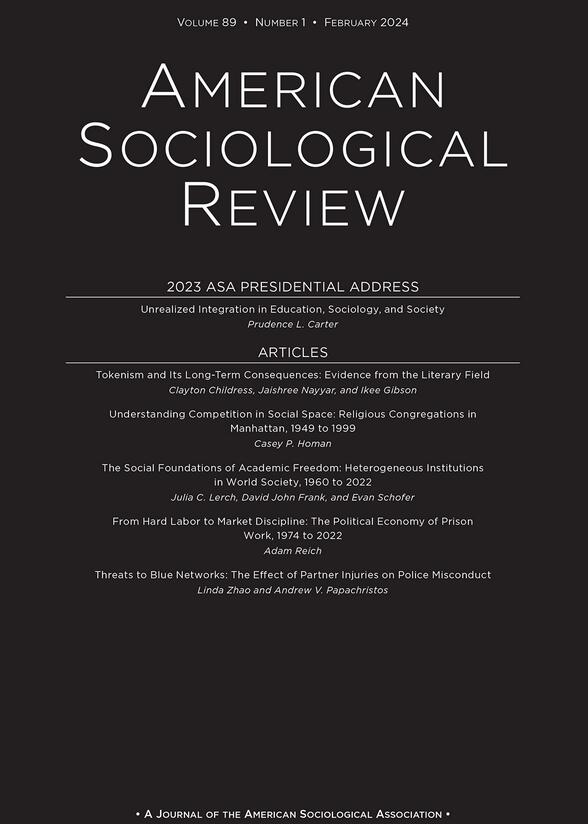谁从职业执照中获利?
IF 6.2
1区 社会学
Q1 SOCIOLOGY
引用次数: 0
摘要
社会学家就职业如何以及为什么对经济不平等产生影响展开了激烈的辩论。我认为,职业许可会改变工资设定,这取决于许可制度的特点。许可不仅限制了市场准入,就像在美国一样;一些政府,比如德国,也会对任务价格进行监管,并为有执照的职业设定特定职业的最低工资标准。我认为,美国的制度导致了整个分销体系中越来越大的许可工资优势,而德国的制度导致了这种优势的下降。此外,我还讨论了女性如何特别受益于许可,因为它减少了女性在工资设定中经常面临的劣势。基于2018年的CPS-MORG和BIBB/BAuA数据,我提出了无条件和性别特定的分位数治疗效果。在美国,处于收入分布中上部分的员工的工资溢价最高,而处于收入分布底部和顶部的员工的工资溢价则较小。在德国,持证员工的工资溢价在较低的季度是最大的,并在较高的季度显著下降。在这两个国家,女性从许可证中获得的利润要高得多。这些结果挑战了许可制度对高层不平等的作用,并表明许可制度减少了弱势群体面临的惩罚。本文章由计算机程序翻译,如有差异,请以英文原文为准。
Who Profits from Occupational Licensing?
Sociologists have debated intensively how and why occupations matter for economic inequality. I argue that occupational licensing alters wage-setting, depending on the characteristics of the licensing system. Licensing not only restricts market entry, as in the United States; some governments, like that of Germany, also regulate task prices and set occupation-specific wage floors for licensed occupations. I claim that the U.S. system leads to a growing licensing wage advantage across the distribution, and the German system leads to a falling one. Furthermore, I discuss how women may particularly benefit from licensing, as it reduces disadvantages women often face in wage-setting. I present unconditional and gender-specific quantile treatment effects based on CPS-MORG and BIBB/BAuA data from 2018. In the United States, wage premiums are highest for employees in the upper-middle part of the distribution and are small for those in the bottom and the top. In Germany, the wage premium is largest for licensed employees within the lower quarter and reduces significantly toward the top. In both countries, women profit significantly more from licensing. These results challenge claims about the role of licensing for inequality in the top, and suggest licensing reduces penalties faced by disadvantaged groups.
求助全文
通过发布文献求助,成功后即可免费获取论文全文。
去求助
来源期刊

American Sociological Review
SOCIOLOGY-
CiteScore
13.30
自引率
3.30%
发文量
35
期刊介绍:
The American Sociological Association (ASA) is a non-profit membership association established in 1905. Its mission is to advance sociology as a scientific discipline and profession that serves the public good. ASA is comprised of approximately 12,000 members including faculty members, researchers, practitioners, and students in the field of sociology. Roughly 20% of the members work in government, business, or non-profit organizations.
One of ASA's primary endeavors is the publication and dissemination of important sociological research. To this end, they founded the American Sociological Review (ASR) in 1936. ASR is the flagship journal of the association and publishes original works that are of general interest and contribute to the advancement of sociology. The journal seeks to publish new theoretical developments, research results that enhance our understanding of fundamental social processes, and significant methodological innovations. ASR welcomes submissions from all areas of sociology, placing an emphasis on exceptional quality.
Aside from ASR, ASA also publishes 14 professional journals and magazines. Additionally, they organize an annual meeting that attracts over 6,000 participants. ASA's membership consists of scholars, professionals, and students dedicated to the study and application of sociology in various domains of society.
 求助内容:
求助内容: 应助结果提醒方式:
应助结果提醒方式:


